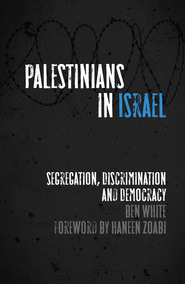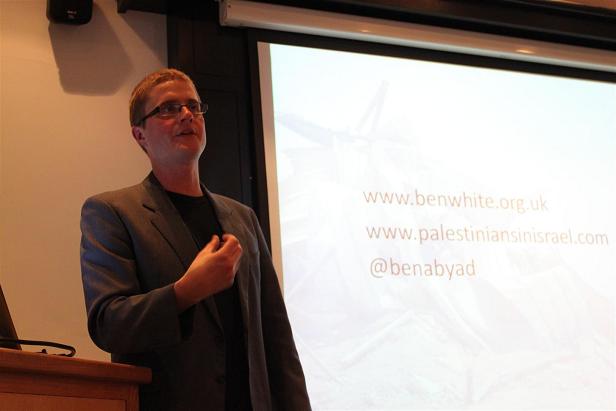Review: ‘Palestinians in Israel’ by Ben White Books
Books, New in Ceasefire - Posted on Tuesday, February 21, 2012 0:09 - 1 Comment
By Hilary Aked
Ben White discusses his new book at the University of Oxford, Feb 4th 2012 (Photo: Becky Worth)
There is a saying in Arabic: “when the judge is your enemy, to whom should you complain?”; a conundrum which sums up the daily lived experience of the one and a half million Palestinians living within Israel, and is the subject of Ben White’s latest book, Palestinians in Israel.
Throughout the book, White refuses to use the term “Israeli Arabs” to refer to those Palestinians who had remained within Israel’s borders in 1948, while 700,000 others were expelled during the Nakba (“the catastrophe”). This label is, he argues, a “deliberate formulation”, the language of the oppressor which at once portrays Israel as multicultural and glosses over the memory of the ethnic cleansing of 1948.
‘Palestinians in Israel: Discrimination, Segregation and Democracy’ employs the same tactic White used in his first book ‘Israeli Apartheid: a beginner’s guide’, focusing on discriminatory legislation – the on-paper evidence of unequal treatment that cannot be refuted. He again quotes heavily, weaving together the evidence to support his arguments, in particular citing illustrative statements by top Israeli politicians throughout history. Many of whom grasped – and were often not afraid to admit – that Israel’s self-definition as “Jewish and democratic” was deeply problematic.
The insidious ideology of Zionism on which the country is founded – Israel’s very raison d’etre – is held up to scrutiny, and its internal contradiction laid bare. As far as the rights of the non-Jewish population are concerned Israel’s two professed traits are conflicting rather than compatible. White argues that whenever tensions have arisen, pitting Israel’s Jewishness against its democratic nature, Zionist principles have always prevailed.
There is a strong emphasis on the need to go back to the beginning – to the Nakba and the creation of Israel – in order to understand the key dimensions of today’s landscape. The wrongs done 60 years ago paved the way for continuing injustice and the roots of the problem then – and to a great extent still, White suggests, lie in racist attitudes. The British politicians who favoured and helped bring about the creation of Israel in the first place frequently had little or no respect for basic principles of human equality or self-determination. Churchill, for instance, believed some races were stronger and “higher grade” while Arthur Balfour said: “we do not propose to even go through the form of consulting the wishes of the inhabitants”.
So, it is implied, Israel did not cease to be “the only democracy in the Middle East” only after the Arab Spring. It was founded at the expense of Palestinians’ rights and has never granted equal rights or equal treatment to them. Instead it has passed a long series of anti-democratic laws tipping the balance further. Due to the theocractic character of the Israeli legal system White chooses to borrow the term “ethnocracy” from Israeli scholar Oren Yiftachel, to describe the nature of the state. And, as a corollary of the elevation of one ethnicity, he points to a wide streak of racism still running through Israeli society.
A contrast drawn by Ariel Sharon, that Palestinians have rights in the land, whereas Israeli Jews have rights to and over the land, is highlighted. In the wake of Israel’s creation, a flurry of legislation swiftly took control of the land for one group and dispossessed the other. In White’s narrative, The Law of Return, the Absentee Property Law, and the Citizenship Law, amongst others, drew the parameters of belonging and entitlement very early on, consolidated and enhanced the ethnic cleansing of the Nakba.
A very useful feature of this book is the attention it pays to the role of non-governmental organisations in entrenching the state’s control on the land of behalf of only some of its citizens. The Jewish Agency and the World Zionist Agency both have statutory powers to administer land, since the Israeli government realised that at least appearing to be at arm’s length from blatant ethnic favouritism would bring benefits. While states should, in theory at least, treat citizens equally, no-one would suggest that a private civil society group need do the same.
These groups, and the enormously powerful Jewish National Fund too, enjoy huge influence and act not only on in the interests of one group of citizens but against the interest of the Palestinians. The JNF, for instance, has been instrumental in legislating the confiscation of land and has established picnic sites and forests on the sites of ethnically cleansed villages. That this organisation considers itself “the caretaker of the land of Israel on behalf of its owners – Jewish people everywhere”, is, according to White, a fundamental point about Israel’s self-image. Unlike any other state, it believes people who don’t live inside its borders are its citizens by virtue of their ethnicity. In contrast the Palestinians who do live within its border are not citizens but merely ‘residents’ of Israel – all they can ever be as non-Jews.
For Zionists, Palestinians living in Israel are the enemy within and constitute a “demographic threat”. A recent example of a discriminatory law designed to force them out is the Nationality and Entry into Israel Law which renders it impossible for Palestinians from Gaza or the West Bank married to Palestinians living in Israel to move to Israel and exercise their right to family life. Since being rendered “present absentees” in the Nakba, Palestinians driven from their homes who settled elsewhere in Israel have been the subject of “internal colonialism…Judaising the Negev and Galilee – the unfinished war of 1948”.
A demonstration of this, White argues, is the new plan to “develop” the Negev region, which would entail the forced relocation of more than 30,000 Bedouin Palestinians. The evidence too, of the plight of the 40-plus unrecognised villages in Israel – Al Araqib, Dahmash and others – which the government refuses to provide infrastructure links to or services for and instead frequently targets for demolition, is hard to ignore.
The crucial point is that these villages are only “illegal” because the state labels them that way. Israeli law is stacked against Palestinians at every level and the Bedouin’s plight is the same as the East Jerusalemites’ in that when planning permission is almost always refused there is little option left but to build illegally and risk demolition. White points out that where the state has categorised a Palestinian village land as agricultural or forestland despite residents living there, a handful have fought for and won recognition through the courts. But these are the exception to the rule. The Judaisation of land Zionists see as their own is relentless and the courts who enforce laws made by Zionist legislators, back up the colonists.
White is keen to stress that the Zionist ideology necessarily, logically and inevitably leads to anti-democratic practices. Israel’s self-definition is “the contradiction at the heart of the conflict” and it is not only hardcore settlers or extreme right-wingers but all Zionists who are inherently against multiculturalism, co-existence and thus anti-Palestinian.
He asks us to imagine, instead of this, a future of equals, free from the inexorably hierarchical logic of Zionism. Though prospects are grim and he is under no illusions about the present dire situation, cynicism is avoided in favour of an idealistic but not impossible hope of a peace based on justice and human rights.
As MK Haneen Zoabi points out in her foreword, the book seeks a “shift away from the paradigm of Occupation as the lens through which the Israeli-Palestinian conflict is viewed”. As such ‘Palestinians in Israel’ is a very valuable contribution to an often internecine Palestinian solidarity movement. As highlighted by the controversy caused last week when Norman Finkelstein effectively endorsed a two-state solution, increasing numbers of people are refusing to look only for a peaceful end to the conflict and a viable Palestinian state – those apparently innocuous and uncontroversial goals which the official peace process has nonetheless long failed to deliver.
A rights-based approach based on equality and justice for all may not sound radical but its implications are sizeable. The book is, in its totality, an argument for putting the two-state solution to bed, for it illustrates how many problems would be left unsolved even if Israel ever did allow a Palestinian state. Not only would such a thing entail abandoning the right of return for refugees, but it would leave intact a whole gamut of legislation which makes Palestinians in Israel second class citizens.
Moving beyond the two-states-for-two-people paradigm which may sound reasonable but is, in essence, the logic of separation, means the solidarity movement should move beyond “occupation discourse”. For White, the civil society BDS movement, in Palestine, internationally and in Israel where possible, helps to focus attention on the right goals: democratisation and decolonisation.
And with his choice of poetic epigraph, White seems to say that a lasting just peace must involve Israelis in a transformative process of liberation as much as it must grant Palestinians their freedom and equality:

“From the windows of my small cell / I can see your large cell”
– from ‘End of a Discussion with a Jailer’ by Samih al-Qasim.
Palestinians in Israel: Segregation, Discrimination and Democracy
Ben White
128 pp.
Pluto Press, London (2012)
1 Comment
happy smiles




The review made me think of “Occupied Minds” by Arthur Neslen, probably one of the best book I’ve read about Israel’s racism. It focuses on Jewish people within Israel and their trials and tribulations of not being the ‘white-jew’ that the Israeli state expects them to be.
“Palestinians in Israel” seems worth the investment, especially in contrast to “Occupied Minds”.